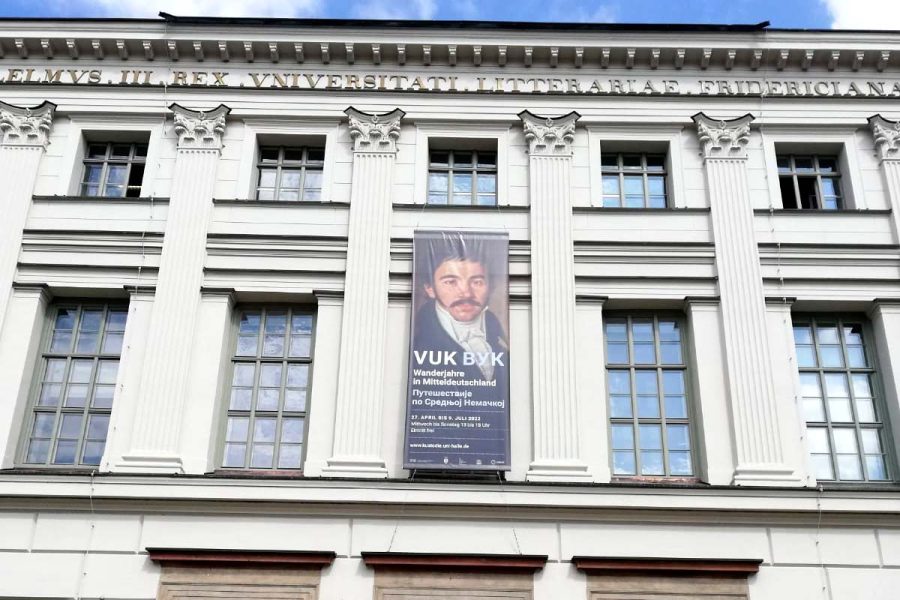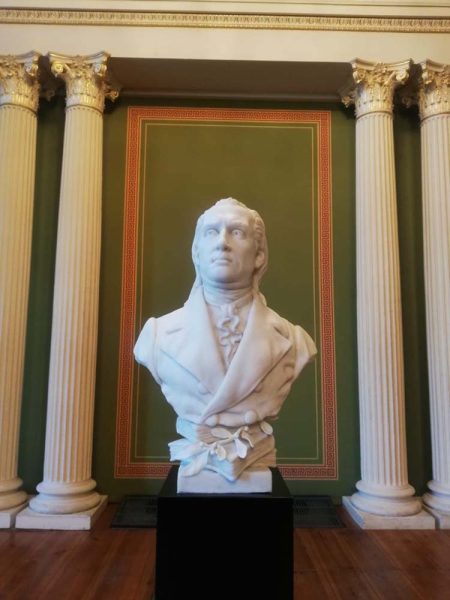This past spring, on 27 April, Serbian Ambassador to Germany Dr Snežana Janković opened an event at the famous Martin Luther University in Halle- Wittenberg, which is over 500 years old, with which the Serbian Embassy in Berlin commemorated two extremely significant anniversaries in the two countries bilateral relations: 240 years since the visit to this university of educator Dositej Obradović, Serbia’s first minister of education, and 200 years since the arrival in Germany of Serbian language reformer Vuk Stefanović Karadžić
This occasion was marked by the opening of an exhibition entitled ‘Vuk Stefanović Karadžić – Travels around Middle Germany’, which was created in cooperation between Martin Luther University Halle-Wittenberg (MLU), the Serbian Embassy in Berlin, Vuk’s Endowment and the Museum of Vuk and Dositej, and which ran until 9 July. The event also saw the MLU ceremonially presented with a bust of Dositej Obradović, representing a gift from the Serbian Academy of Sciences and Arts, which was presented on behalf of SANU by its vice president, academic Miodrag Marković. At the suggestion of the Serbian Embassy, the MLU entered the name of Dositej Obradović in the University’s permanent exhibition, thereby ranking him among the most important alumni since the founded on this renowned university.

Addressing those gathered, Ambassador Janković emphasised that Serbs are still inspired today, two centuries on, by the visits of Dositej and Vuk to Germany, as well as by their collaborations with famous Germans like Goethe, Schiller, the Brothers Grimm, Ranke, Herder and others. She added that these historical visits also encourage us to work with even greater energy and enthusiasm to bring our peoples closer together and to strengthen cultural and educational cooperation between Serbia and Germany.
Ambassador Janković pointed out that these two figures connect us over the course of centuries and remind us that our bilateral relations with Germany, which have often been confronted by difficult challenges throughout history, also contain a great wealth of contacts, mutual understanding and a desire to better mutually acquaint the two peoples and cultures
Highlighting the central importance of Vuk and Dositej to Serbian culture and history as a whole, but also to the affirming of Serbian and South Slavic literature across Europe and around the world, Ambassador Janković pointed out that these two figures connect us over the course of centuries and remind us that our bilateral relations with Germany, which have often been confronted by difficult challenges throughout history, also contain such a wealth of contacts, mutual understanding a great desire to better mutually acquaint the two peoples and cultures.

Those gathered to celebrate these two iconic figures of Serbian literature and education in Germany were addressed by MLU Rector Claudia Becker Ph.D., as well as by the authors of the exhibition: Slavic Studies Professor Katrin Schlund and University Archives director Professor Dirk Schaal. They stressed that this university has always been a gathering place for students from various countries, and that it is an honour for them that the MLU can also be proud of the fact that such important figures of Serbian culture have stayed there.
The exhibition featured a collection of Vuk’s personal items, manuscripts, letters and books, providing intimate insight into his life. Visitors explored the evolution of his ideas and his tireless efforts to promote Serbian culture and language. The artefacts on show served as a bridge between two rich cultural traditions, demonstrating the profound impact of cross-cultural exchange. Providing special value to this exhibition was the fact that it included archival documents, photographs, records and other exhibited artefacts that were made available by numerous German scientific and cultural institutions from the cities of Jena, Leipzig, Kassel, Weimar, Göttingen and elsewhere.
Among many visitors, this exceptional event was attended by officials of the City of Halle, professors and students of Slavic studies at the MLU, representatives of the broader academic and scientific community, representatives of cultural and educational institutions from Halle, as well as representatives of the Serbian diaspora from this city and the states of Saxony Anhalt and Saxony.